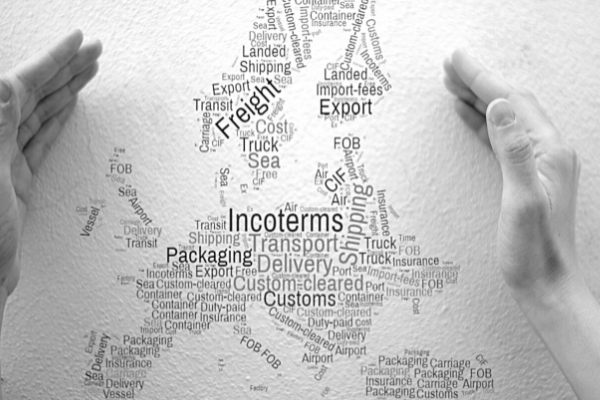BY:
SHARE:

This is not a new topic and, of course, that is the big frustration – despite Incoterms® reviews every decade there is still a huge problem, globally, with the misuse of Incoterms®.
This is not a new topic and, of course, that is the big frustration – despite Incoterms® reviews every decade there is still a huge problem, globally, with the misuse of Incoterms®. As the terms provide the fundamental framework for international, regional (and, in some circumstances, domestic) sales contracts, it is crucially important that the counterparties understand the risk, delivery, responsibility and cost implications of the terms they are using. Notwithstanding this, globally, ask the question “What are Incoterms®?” and you will get the answer “Oh yes, that is FOB, C and F and CIF isn’t it?” That may have been the correct answer in 1936 but not anymore!
Misuse of the terms is generally manifested in one, or more of the following ways: Using terms not appropriate to the transportation mode, for example using FOB / CFR / CIF for containerised multi-modal transportation. Altering or modifying terms, for example ‘Ex Works Loaded.’ Or, using an out-of-date term but quoting the current version, for example DAT Incoterms® 2020. These types of misuses are not, unfortunately, unusual and many readers will have examples from their own experiences.
The two key questions are ‘why does this happen?’ and ‘does it really matter?’ A quick glance at the LinkedIn Incoterms group will evidence that most queries about Incoterms® can be answered by simply telling the enquirer to read the book. This is actually very good advice, so long as it is supported by appropriate, structured training. In many countries the cost of the publication is prohibitive for SMEs, so internet research becomes the supposedly best option. However, this is fraught with problems. A simple Google search will trigger pages of information about Incoterms® but much of it is incorrect or, at least, seriously flawed. Like any internet search, the source of the information must be checked for accuracy and integrity – and the only way to do this is to refer to the ICC publication itself and to attend appropriate training. It may be that, in the current Incoterms® 2020 review, innovative solutions to promulgate the terms will be considered. The training side is also important so that the trading community, and other stakeholders not only understand the rules but also understand the rationale behind them. This would support the terms being correctly applied within both internal procedures and contracts. It would also enable businesses to have the confidence to sensitively ‘educate’ their counterparties to use the correct terms.
Does it really matter? Well, yes it does. The incorrect use of Incoterms® can have dire consequences, including incorrect division of costs between parties, refusal of insurance claims, inadequate insurance cover, responsibilities such as insurance, export / import customs clearance or haulage arrangements falling through the gaps – all of which can lead to costly and extended disputes and a breakdown in the relationship between the seller and buyer. The value of Incoterms® is that they are prescriptive on what buyer and seller must pay for, where their respective responsibilities lie, the point at which the goods are legally delivered and the exact point at which transit risk is passed from seller to buyer. If incoterms ® are not used, or are adapted, then all these basic elements must be articulated in extensive detail on each transactional contract document. Additionally, the sales contract and purchase order must be forensically checked to ensure all relevant details are an exact match. Amending the terms can be as problematic as using the wrong term – for example, if the responsibility under a term is altered, such as ‘EXW Loaded’, is there also an intention to alter the cost division and the point at which risk passes? Were the cargo to be damaged on loading, this could trigger a complex dispute. It is a sad reality that many traders only look at their contracting and Incoterms® policy when something goes wrong, which is rather too late!
Further difficulties can ensue when a direct correlation is made an Incoterm and revenue recognition or the passing of title from seller to buyer. These milestones can be related to the Incoterm used but are not inherent elements within the terms, nor should they be.
Cross border trade transactions are, by their nature, complex. Several stakeholders are involved, and the principal contracting parties are in different countries, possibly using different languages and covered by different jurisdictions. Incoterms® were established to set a series of common standards, accepted internationally, which can form a universally understood and acknowledged backbone to the over-riding contract. By using the terms as they were intended, potential language and jurisdiction related confusion can be mitigated to a very large extent. Most disputes in international trading relate to the division of costs between the parties. The resolution is encompassed in the Incoterms® publication, which clearly denotes what the seller must pay and, correspondingly, what costs the buyer is responsible for.
It must be recognised that Incoterms®, as published, will not be appropriate for every contract or commodity. However, they are appropriate for the vast majority of global trade transactions. Some commentators say that the problem of misuse is that Incoterms® reviews are too frequent, generally about every ten years. However, arguably, this is one of the strengths of the protocol – the rules are designed around contemporary practice in trading, logistics, insurance, regulatory control, and banking, all of which are dynamic activities that develop and change over time. In order to remain current and relevant to what actually happens on the ground, the review cycle is entirely appropriate, proportionate, and relevant.
In conclusion, what is the solution to the widespread misuse of Incoterms®?
- Easy access to the official version of the rules
- Training – both initial and periodic updates
- Incorporation into importers and exporters’ procedures and conditions
- Management buy-in to correct adaption of the terms
- Increased engagement and promotion by ICC national committees in some countries
While you are here you may be interested in some Strong & Herd LLP training courses related to this topic:
Focus on: Incoterms® 2020 Rules
OneCall™ Email assistance as and when required; A one-call solution for all your import, export and customs enquiries. Export help. Import help. Customs help.
Stay informed about customs and international trade matters by subscribing to our OneCall™ service. This comprehensive offering includes a dedicated email helpline for support, timely practical updates direct to your inbox (Did You Know?), monthly UK Customs & Trade Briefings and access to an interactive members' area with an exclusive community for our subscribers.
International Trade Updates & Spotlight Newsletter
Subscribe to our free information emails covering international trade topics...









